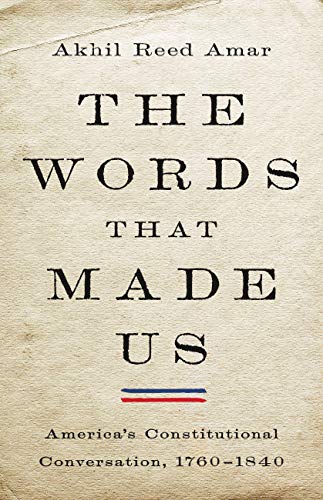14 Constitutions Books That Separate Experts from Amateurs
Quinn Cummings, Glenn Kirschner, and Mueller She Wrote recommend these essential Constitutions Books for mastering foundational and modern constitutional issues







What if the Constitution isn't just a dusty document but a living battleground for rights and justice? Today, as debates over constitutional interpretation surge, understanding these texts is more urgent than ever. From racial justice to executive power, the stakes are high and the stakes are real.
Leading voices like Quinn Cummings, an author who found herself challenged to rethink the Constitution's impact on social justice, and Glenn Kirschner, a former federal prosecutor who highlights the document's fight for fairness, have turned to these books for insight. Mueller She Wrote, a political commentator, praises the sharp clarity these works bring to complex legal debates.
While these expert-curated books provide proven frameworks, readers seeking content tailored to their specific constitutional interests and backgrounds might consider creating a personalized Constitutions book that builds on these insights. This approach helps bridge foundational knowledge with your unique learning goals.
Recommended by Quinn Cummings
Author and ghostwriter
“You get it; I love the book. "But, what does this have to do with y-" I'm getting there. While reading a book about not pretending otherwise anymore, even if it feels cozy, I got an email from someone I know, asking if she could pick my brain about writing.” (from X)
Elie Mystal, a Harvard-educated legal analyst known for his sharp commentary on justice and the Supreme Court, takes on the Constitution with a bold, irreverent voice. In this book, you learn to see the founding document not as untouchable law but as a battleground where rights are contested, especially for women and people of color. Mystal breaks down complex legal concepts like substantive due process and judicial influence with humor and clarity, making it accessible for those without legal training. Chapters like "The Taking of Black Land" challenge you to rethink historical and contemporary injustices embedded in constitutional interpretation. This book suits anyone eager to understand and defend civil rights against conservative legal strategies.
Recommended by Annette Gordonreed
Professor of Law and History, Harvard University, Pulitzer Prize winner
“@CharlesPPierce No. Just a regular class. Interesting book.” (from X)
Drawing from his dual expertise as a Sterling Professor of Law and Political Science at Yale, Akhil Reed Amar explores the heated debates shaping America's Constitution from 1760 to 1840. You gain a nuanced understanding of how foundational questions—like territorial expansion, slavery, and judicial roles—were contested by ordinary citizens and statesmen alike, offering insights into the Constitution’s ongoing evolution. For example, Amar sheds light on the debates over Indian nations’ rights and judicial power that many overlook, grounding these discussions in vivid historical context. If you want to grasp the Constitution’s origins beyond the text itself, this book delivers a detailed narrative that challenges simplistic interpretations and enriches your perspective.
TailoredRead AI·
This tailored book explores the foundational principles and history of constitutions with a focus uniquely matched to your interests and background. It examines key constitutional developments, critical legal interpretations, and landmark historical moments, all organized to align with your specific goals. By tailoring content to your areas of curiosity and knowledge level, it reveals intricate connections between constitutional theory and real-world application. This personalized approach helps you navigate complex ideas efficiently, making the learning experience engaging and relevant. Whether you seek to deepen historical understanding or sharpen legal insight, this book offers a carefully crafted pathway through constitutional mastery.
Recommended by George Washington
First U.S. President, Founding Father
“If in the opinion of the People, the distribution or modification of the Constitutional powers be in any particular wrong, let it be corrected by an amendment in the way which the Constitution designates. But let there be no change by usurpation; for though this, in one instance, may be the instrument of good, it is the customary weapon by which free governments are destroyed.” (from Amazon)
Delegates of The Constitutional Convention(you?)·
Delegates of The Constitutional Convention(you?)·
The delegates who crafted this foundational text during the 1787 Constitutional Convention created more than a legal document—they laid out a structure that defines American governance and civic rights. You’ll gain a clear understanding of the powers and limitations of the federal government’s branches, as well as the fundamental rights guaranteed to citizens, such as freedom of speech and religion. The book also includes the Declaration of Independence, providing insight into the principles that spurred American independence. Whether you’re a student of history, law, or politics, this concise edition offers direct access to the original words shaping the nation’s political landscape.
Recommended by George Washington
First US President, Founding Father
“The Constitution is the guide which I will never abandon.” (from Amazon)
The Constitution and the Declaration of Independence
The Constitution of the United States of America
Paul B Skousen, Dan Clark, Tim McConnehey(you?)·
Paul B Skousen, Dan Clark, Tim McConnehey(you?)·
Unlike most politics books that focus on abstract theories, this work stems from Paul B. Skousen's unique blend of journalism, national security expertise, and firsthand experience in the White House Situation Room. You gain direct access to the full texts of the Constitution and Declaration of Independence, accompanied by Skousen's detailed commentary that unpacks the Founding Fathers' original intent and the evolution of constitutional law. For example, his analysis of the amendments offers clarity on how historical contexts shaped modern interpretations. Whether you’re a scholar, legal professional, or history enthusiast, this book sharpens your understanding of American governance and the principles that continue to influence the nation today.
Recommended by Library Journal Review
“Focusing on the Constitution’s history, including the Articles of Confederation, the Philadelphia Convention, the Bill of Rights, and selected other amendments … Most recent similar titles are limited to the full text of the founding documents … will interest general readers as well as students of political science, government, and teacher education.” (from Amazon)
David L. Hudson Jr JD(you?)·
David L. Hudson Jr JD(you?)·
David L. Hudson Jr., a seasoned law professor with deep expertise in First Amendment law, offers a detailed exploration of the United States Constitution that goes beyond the text itself. You’ll uncover the historical context behind the Articles of Confederation, the Philadelphia Convention, and the Bill of Rights, while also examining the evolving interpretations of the Constitution’s broadly worded clauses. The book breaks down complex topics like judicial review, presidential pardons, and Supreme Court controversies in a way that sharpens your understanding of your rights and government powers. If you’re interested in how constitutional law shapes modern political debates, this book will guide you through the nuances with clarity and authority.
TailoredRead AI·
This tailored book explores the Constitution through a focused 90-day learning journey designed to match your background and specific goals. It covers foundational principles and evolving interpretations, providing a personalized pathway to grasp key constitutional concepts efficiently. The content examines landmark cases, constitutional debates, and the practical impact of constitutional law within your areas of interest. By tailoring complex expert knowledge to your unique needs, it reveals how constitutional ideas shape governance, rights, and justice in real time. This approach delivers a clear, engaging exploration that deepens understanding without overwhelming you, making constitutional mastery accessible and relevant.
Recommended by Phillip Carter
RAND researcher and Georgetown Law adjunct
““Rights can be gained, and rights can be taken away. A century and a half after the end of slavery, the project of equal citizenship remains unfinished.” A poignant end to Eric Foner’s brilliant new book “The Second Founding,” a short history of the 13th, 14th & 15th Amendments.” (from X)
Drawing from decades as a historian specializing in the Civil War and Reconstruction, Eric Foner traces how three pivotal constitutional amendments reshaped American law and citizenship. You’ll gain insight into how the 13th, 14th, and 15th Amendments established equality and citizenship rights, only to face retrenchment through judicial decisions and state actions during Jim Crow. The book examines specific chapters on the political origins of these amendments and their erosion, helping you understand the ongoing debates over voting rights and due process today. This concise history suits anyone seeking a nuanced grasp of how constitutional law evolved in the 19th century and its lasting impact on civil rights.
Recommended by Publisher's Weekly
“Khan’s optimism and dedication to the ideals of America’s Founding Fathers infuse this inspiring and instructive work.” (from Amazon)
Drawing from his unique background as a U.S. Supreme Court bar member and Gold Star father, Khizr Khan offers an approachable, deeply personal exploration of the U.S. Constitution aimed at young people. You’ll find not just a historical overview but reflections that connect the document’s articles and amendments to lived experience, including pivotal Supreme Court rulings and the Bill of Rights. The book breaks down complex legal language into understandable segments, making it clear why these rights matter to every citizen. If you want to grasp both the legal foundations and the enduring democratic values behind the Constitution, this book guides you thoughtfully through that journey.
Recommended by Arnold Schwarzenegger
Actor and Former Governor of California
“I wish this book existed 50 years ago when I moved to the United States. Ben's constitutional breakdown is a must-read for every current and aspiring citizen.” (from Amazon)
Ben Sheehan(you?)·
Ben Sheehan brings his background as an award-winning digital producer and civic educator to demystify the U.S. Constitution in a way few have attempted. He breaks down the document clause by clause, translating dense legal language into accessible, modern explanations that clarify how government powers and processes truly operate—from presidential authority to Supreme Court nominations and constitutional loopholes. You'll gain concrete knowledge of the Constitution’s structure and implications, empowering you to engage more confidently as a voter and citizen. This book is especially useful if you want to understand the foundations of American democracy without wading through legal jargon or dry commentary.
Recommended by Cass Sunstein
Harvard Law Professor, White House Official
“Magisterial... The Framers' Coup might well be the best book ever written on the founders and their handiwork. With impressive, even loving detail, and mostly emphasizing historical facts rather than his own opinions, Klarman conjures up the framers' whole world... riveting.” (from Amazon)
Michael J. Klarman(you?)·
Michael J. Klarman(you?)·
Michael J. Klarman, a Harvard Law professor and Bancroft Prize winner, offers a detailed account of the fraught process behind the United States Constitution’s creation. You’ll gain insight into the intense debates and competing interests at the Philadelphia Convention, such as the tensions between large and small states, and the compromises over slavery representation. The book walks you through pivotal moments like Hamilton’s quasi-monarchist speech and Patrick Henry’s opposition, revealing how political self-interest shaped the final document. If you want to understand the Constitution as a product of negotiation and power struggles—not just lofty ideals—this narrative provides that perspective with depth and narrative skill.
Recommended by Matt Batzel
National Executive Director, Conservative Leader
“Do yourself a favor and buy yourself and your favorite American a copy of Ned Ryun's new Book: Restoring Our Republic” (from X)
Ned Ryun(you?)·
After analyzing the origins of America’s constitutional republic, Ned Ryun developed a detailed narrative tracing the ideas from ancient civilizations through the Founders’ design. You’ll learn how Judeo-Christian values and classical philosophy shaped the Republic’s framework and how modern forces have challenged these foundations. Chapters dissect the machinery of government the Founders built to safeguard liberty, alongside insights into its gradual dismantling by progressive agendas. This book suits anyone questioning the current political landscape and seeking a historical lens to understand and potentially reclaim American principles.
Recommended by Sam Altman
CEO of OpenAI, Former Y Combinator CEO
James Madison, Edward J. Larson, Michael P. Winship(you?)
James Madison, Edward J. Larson, Michael P. Winship(you?)
The research was clear: traditional accounts of the Constitutional Convention often miss the nuanced debates that shaped the U.S. Constitution. James Madison’s meticulous notes, now presented with modern clarity by Edward J. Larson and Michael P. Winship, offer you an insider’s view of the 1787 convention, revealing the push-and-pull among delegates over federal power, commerce, and state sovereignty. You’ll gain insight into the personalities behind the framers, the political stakes at play, and the complex compromises that forged a new national government. This book suits anyone eager to understand the Constitution’s origins beyond textbook summaries, especially students, historians, and civic-minded readers.
Recommended by Swara Bhasker
Bollywood actor and activist
“There is perhaps not a more relevant book to read at this moment in our than @MadKhosla ‘s definitive account of why our Constitution is both surprising and special! MUST READ people! Congratulations Madhav ji :)” (from X)
When Madhav Khosla examines the birth of India’s Constitution, he reveals a bold experiment in democracy under daunting circumstances. Drawing on his expertise as a Columbia law professor, Khosla explains how India’s founders crafted a constitutional system that embraced universal suffrage amid widespread poverty and social divisions, defying British colonial assumptions. You’ll gain insight into the political strategies and constitutional choices that enabled democracy to take root in such a complex society, especially through chapters detailing the framing debates and institutional innovations. This book suits anyone interested in constitutional law, democratic theory, or the political history of post-colonial states.
Recommended by Jack Goldsmith
Professor at Harvard Law, Hoover Institution Fellow
“My discussion with the great Michael McConnell, about his great new book on Article II of the Constitution.” (from X)
Michael W. McConnell, Stephen Macedo(you?)
Michael W. McConnell, Stephen Macedo(you?)
During a time when presidential power faces intense scrutiny, Michael W. McConnell takes you through the framers’ deliberate crafting of executive authority to prevent tyranny without hampering effective governance. Drawing on the Tanner Lectures at Princeton, the book dives into the evolution of powers stripped from the British monarch and how each was reconsidered for the presidency, offering a nuanced framework distinguishing powers under congressional oversight from those reserved for presidential discretion. You’ll gain clarity on the original constitutional intent behind executive limits, informed by careful analysis of early drafts and legal history. This book is particularly suited for anyone seeking to understand the constitutional balance of power in America’s divided political landscape.
Recommended by Al Deplorable Cultist
US Constitution advocate and political commentator
“@DonaldS83027032 @SJPFISH Not familiar with that book, but Mark Levin wrote a book called Men In Black ... How the Supreme Court is Destroying America! Great book!” (from X)
Mark R. Levin, Rush Limbaugh(you?)·
Mark R. Levin, Rush Limbaugh(you?)·
Mark R. Levin, a seasoned constitutional lawyer and conservative commentator, challenges the unchecked power of the Supreme Court in this incisive critique. He examines how the court has strayed from the framers' intentions, highlighting cases that redefine free speech, religious expression, and immigration rights in ways that spark intense debate. You’ll gain insight into the judicial philosophies and decisions shaping America’s political and cultural landscape, with chapters detailing landmark rulings and their societal impacts. This book suits anyone keen to understand the judiciary’s role in shaping law and policy beyond the headlines.
Conclusion
Exploring these 14 books reveals key themes: the Constitution as a contested text shaped by political battles; its evolving role in protecting rights; and the ongoing tension between federal power and individual liberties. If you're grappling with constitutional history, start with The Words That Made Us or The Framers' Coup to understand the origins. For practical insights, combine The Constitution Explained with OMG WTF Does the Constitution Actually Say? to ground theory in today’s realities.
For those focused on civil rights or executive power, The Second Founding and The President Who Would Not Be King offer nuanced perspectives. Alternatively, you can create a personalized Constitutions book to bridge the gap between general principles and your specific situation.
These books can help you accelerate your learning journey and deepen your grasp of constitutional law’s enduring relevance.
Frequently Asked Questions
I'm overwhelmed by choice – which book should I start with?
Start with "The Constitution Explained" for a clear, accessible overview. Then, explore "Allow Me to Retort" for critical perspectives or "The Words That Made Us" for historical context.
Are these books too advanced for someone new to Constitutions?
Not at all. Titles like "This Is Our Constitution" and "OMG WTF Does the Constitution Actually Say?" are designed to be approachable for newcomers.
What's the best order to read these books?
Begin with foundational texts like "The Constitution of the United States and The Declaration of Independence," then move to historical analyses and contemporary critiques for depth.
Should I start with the newest book or a classic?
Balancing both works best. Classics offer foundational knowledge, while newer books provide fresh perspectives on ongoing constitutional debates.
Do I really need to read all of these, or can I just pick one?
Each book offers unique insights, but choosing based on your specific interests—history, law, or civil rights—can maximize your understanding efficiently.
How can I get constitutional insights tailored to my interests and experience level?
While these expert books are invaluable, personalized Constitutions books can complement them by focusing on your unique goals and background. Consider creating your own tailored Constitutions book to bridge expert knowledge with personal application.
Help fellow book lovers discover great books, share this curated list with others!
Related Articles You May Like
Explore more curated book recommendations













